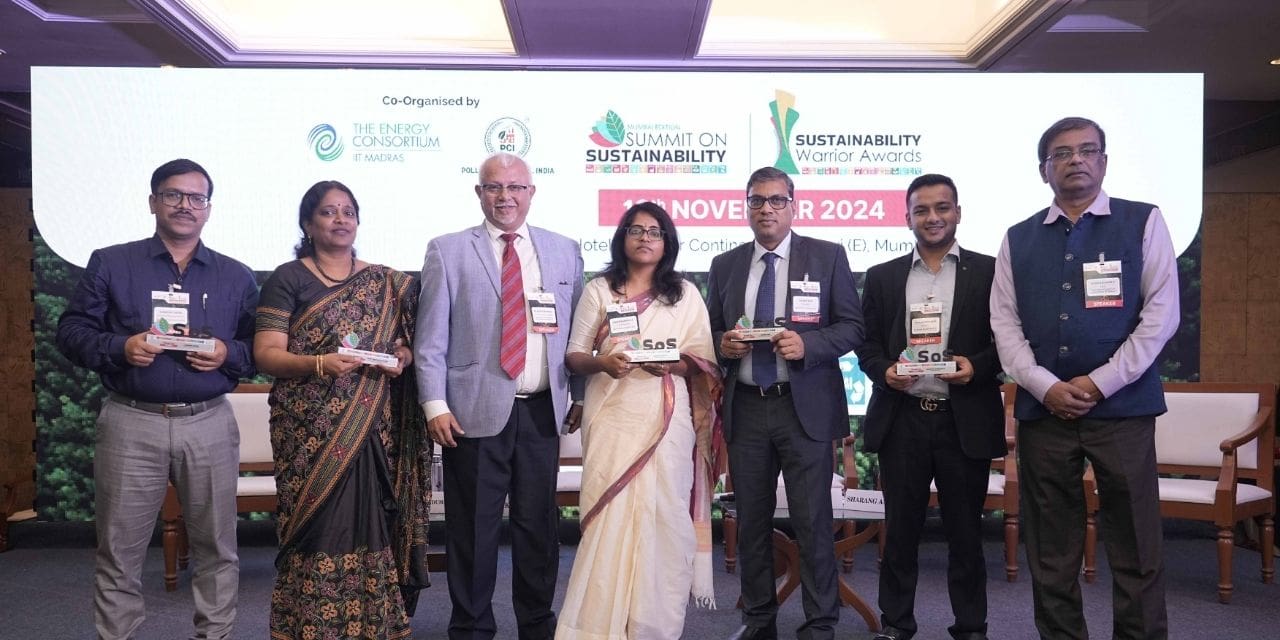The Energy Consortium, which includes IIT Madras and Pollution Control India, is hosting the Summit on Sustainability 2024, where India’s dedication to climate action and sustainable development will be highlighted. In order to discuss and plan solutions that are in line with the Paris Agreement, the Sustainable Development Goals (SDGs) of the UN, and India’s own sustainability objectives, the event brings together leaders from many industries.
India’s commitment to a sustainable future is evidenced by its advancements in emission reduction and the growth of renewable energy. Building on these successes, the Summit on Sustainability aims to promote cooperation and exchange practical knowledge for climate action. The program will cover important topics including Mission LiFE (Lifestyle for Environment), Waste-to-Wealth Innovations, Corporate Sustainability Efforts, Grassroots Leadership, and the Adoption of the Circular Economy.

Distinguished guests such as Nikhil Tambe, CEO of The Energy Consortium at IIT Madras, Anuradda Ganesh, Co-Founder of ARANTREE Consulting Services Pvt Ltd, and Professor at IIT Madras, Dr. Indumathi Nambi, Professor at the Environmental Engineering & School of Sustainability at IIT Madras, Nishita Gupta, Head of Sustainability & ESG, Suzlon Energy Ltd., Arjav Pandya, Chief Manager, Petrochemical Marketing at Hindustan Petroleum Corporation Limited (HPCL), Ramveer Tanwar, Founder of Say Earth NGO, Dr. Mala Singh, Founder & Director, PEC Greening India; Chairperson, IGBC(CII) Mumbai Chapter,Ashish Jain, the founder of the Indian Pollution Control Association; Smita Ram, co-founder and CEO; Rang De; Biren Vora, director of the Ekaagra Social & Microfinance Foundation; Sanjay M. Mahajani, professor in the Department of Chemical Engineering; and Nandakumar E., CEO of the International Centre for Clean Water.
“Water is essential to business and civilization, yet pollution and scarcity are major global issues. We create at the nexus of technology, sustainability, and community impact at the International Center for Clean Water (ICCW), an initiative of IIT Madras. Our work includes evaluating more than 130 water quality criteria, developing prediction models on water quality, availability, and its relationship to energy and health, and promoting industrial R&D to reduce effluent pollution. We hope to guarantee water’s sustainable usage while promoting environmental resilience, public health, and economic prosperity by cultivating a culture of respect for it.stated the International Centre for Clean Water’s CEO, Nandkumar E.
- ANURADDA GANESH, Co-Founder of ARANTREE Consulting Services Pvt Ltd, Professor, IIT Madrassaid,”At ARANTREE Consulting Services, an incubation initiative at IIT Madras Research Park, we are committed to driving decarbonization and sustainability through evidence-based solutions. Our expertise spans life cycle assessments, carbon footprint analysis, technology readiness evaluations, and tailored decarbonization roadmaps. By leveraging advanced technologies such as AI, ML, and robotics, and fostering interdisciplinary collaborations, we aim to create scalable, resilient, and economically viable solutions for industries. Sustainability is not just an agenda, but a critical necessity shaped by climate urgency, regulatory pressures, and social responsibility, making this a transformative era for businesses and communities alike.”
Sathvik Batte, CEO, Marichin Sustainables said, “We’re committed to helping companies mitigate their emissions through carbon credits and offsets. We’re also excited about venturing into renewable energy, as the sustainability industry continues to grow. Over the past 2-3 years, sustainability has gained significant momentum, and we’re only scratching the surface. For India, the potential is immense, supported by the vision of Prime Minister Modi. India could become the carbon credit capital of the world and a leader in sustainable technologies. Solar energy, for instance, has become cheaper than thermal power. Similarly, technologies like direct air capture, despite initial skepticism, will mature and become cost-effective by 2050. The future is bright for sustainability, and events like the Summit on Sustainability are crucial for fostering valuable conversations and partnerships.”
Speaking at the Inaugural ceremony Himakshi Singh, spokesperson for the event said “Our goal is to inspire ongoing engagement that yields impactful results. The summit will serve as a one-time event and a catalyst for sustained dialogue and innovation toward a greener future. By embracing eco-friendly practices such as energy conservation, waste minimization, and renewable energy adoption, and leveraging government support through subsidies, we can foster a collective transition towards sustainability. As we integrate stronger ESG frameworks and comply with new reporting standards, collaboration between academia, industry, and regulators will drive us closer to achieving India’s net-zero targets and addressing the critical challenges of climate change.”
At COP29, the global G20 leadership admitted that climate impacts are already ripping shreds out of every G20 economy, wrecking lives, pummeling supply chains and food prices, and fanning inflation. Bolder climate action is basic self-preservation for every G20 economy. Without rapid cuts in emissions, no G20 economy will be spared from climate-driven economic carnage.
The experts at the Summit on Sustainability, along with academia, the industry and NGOs, will share their insights on sustainable practices, technology advancements in green energy, and the role of local communities in driving effective climate action. The future beckons us towards Quantum AI which will be critical to develop sustainable solutions for energy and resource management.
The Summit on Sustainability promises to equip attendees with actionable insights, practical frameworks, and collaborative pathways toward a sustainable future. Through these conversations, India continues to emphasize its leadership role in global climate action, making sustainability not only an agenda but a guiding principle for businesses, communities, and individuals alike.

